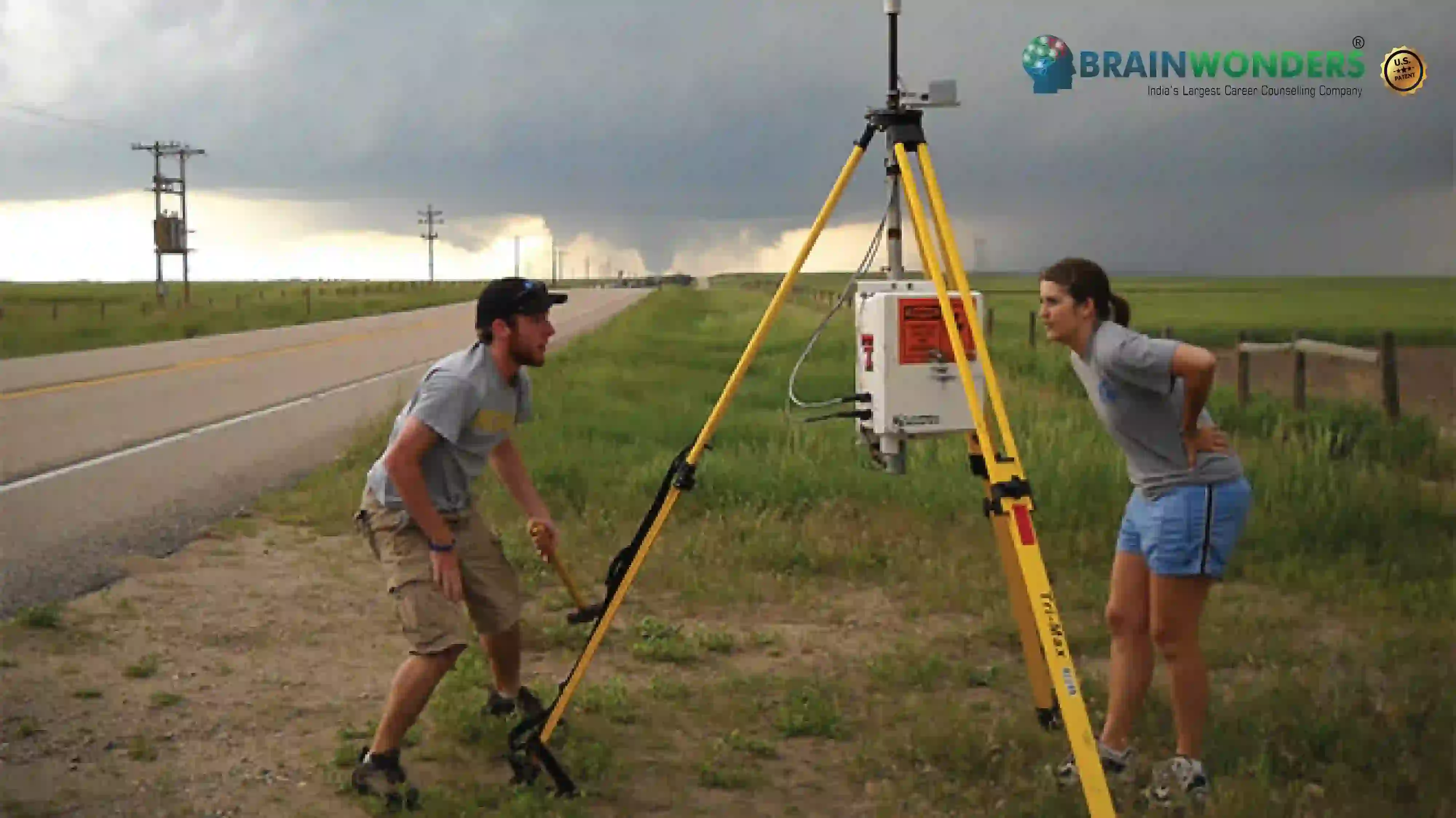How to become a Range Manager
Overview, Courses, Exam, Colleges, Pathways, Salary

Overview
Who is Range Manager ?
The range manager is also known as a natural resource manager, natural resource specialist. They study rangeland management practices. They provide sustained production of wildlife, forage, livestock, help ranchers plan, regulate grazing, improve and protect rangelands, organize grazing systems to manage. The range manager assesses and measure vegetation resources for environmental impact statements, biological assessment companies, and rangeland monitoring programs. A range manager is the one who improves and measures the quality of forests. Ranch managers help to protect forests, develop, maintain the forest. Range managers work in all types of weather, outdoors in remote locations. They use equipment like hardhats, protective eyewear and safety clothing, and proper safety measures. They do research and study rangeland management practices.
Typical day at work
What does Range Manager do?
A Range Manager is responsible for overseeing and managing rangelands, which are large areas of land used for grazing livestock and providing habitat for wildlife. Their role is vital in maintaining the health and productivity of these ecosystems while balancing the needs of agriculture, wildlife conservation, and sustainable land use. Here are the primary duties and responsibilities of a Range Manager:
- Rangeland Assessment: Conducting assessments of rangeland conditions, including vegetation health, soil quality, water resources, and wildlife habitat, to determine the overall health and productivity of the land.
- Grazing Management: Developing and implementing grazing plans that optimize livestock grazing while preventing overgrazing and promoting healthy vegetation growth.
- Invasive Species Control: Identifying and managing invasive plant species that can disrupt the natural balance of rangeland ecosystems.
- Wildlife Conservation: Collaborating with wildlife agencies to create and maintain suitable habitats for native wildlife species that depend on rangelands.
- Range Improvement Projects: Designing and implementing projects to improve rangeland conditions, such as reseeding native plants, erosion control, and water resource development.
- Monitoring and Data Analysis: Collecting and analyzing data on rangeland health, vegetation growth, and wildlife populations to assess the effectiveness of management strategies.
- Sustainable Land Management: Developing and promoting sustainable land management practices that preserve rangelands' long-term health and productivity.
- Collaboration and Outreach: Working with ranchers, landowners, government agencies, conservation organizations, and other stakeholders to build partnerships and promote responsible land stewardship.
- Environmental Education: Providing educational programs and outreach to raise awareness about the importance of rangeland conservation and sustainable land use practices.
- Compliance with Regulations: Ensuring compliance with environmental regulations and permits related to rangeland management.
- Environmental Impact Assessment: Assessing the potential impact of development projects on rangelands and providing recommendations for mitigating adverse effects.
- Conservation Planning: Contributing to developing conservation plans and policies to protect and preserve rangelands and the biodiversity they support.
Abilities and Aptitude needed
What are the skills, abilities & aptitude needed to become Range Manager?
Becoming a successful Range Manager requires a combination of abilities, skills, and aptitudes to manage and sustain rangelands effectively. Here are some critical attributes needed for this profession:
- Knowledge of Ecology and Natural Resources: Range Managers must understand ecological principles, plant and animal species, and the dynamics of rangeland ecosystems to make informed management decisions.
- Problem-Solving Skills: Range Managers encounter various challenges related to land degradation, invasive species, and livestock management. Strong problem-solving skills are essential to address these issues effectively.
- Land Management Expertise: Proficiency in land management practices, including range assessment, soil conservation, and vegetation monitoring, is crucial for sustainable rangeland management.
- Range Conservation and Restoration: Range Managers should know conservation and restoration techniques to improve and maintain the health and productivity of rangelands.
- Livestock Management: Understanding livestock behaviour, nutrition, and grazing patterns is vital as Range Managers often work closely with ranchers to develop grazing plans that benefit the land and livestock.
- Communication Skills: Effective communication with stakeholders, ranchers, and government agencies is necessary to convey management plans, obtain support, and ensure cooperation in rangeland conservation efforts.
- Data Analysis and GIS: Analyzing vegetation, soil, and wildlife data using Geographic Information Systems (GIS) helps Range Managers make informed decisions and track changes over time.
- Adaptability and Fieldwork: Range Managers often work in remote and challenging environments, necessitating adaptability and a willingness to conduct fieldwork in varying weather conditions.
- Environmental Policy and Regulations: Familiarity with environmental policies and regulations is essential to ensure compliance with legal requirements and permits for rangeland management.
- Leadership and Teamwork: Range Managers may work with a team of professionals, including researchers, wildlife biologists, and landowners. Leadership and teamwork skills are essential for effective collaboration.
- Conservation Ethics: Range Managers should have a solid commitment to conservation ethics and sustainable land use practices, promoting the long-term health of rangeland ecosystems.
- Conflict Resolution: Dealing with competing interests and stakeholder conflicts requires diplomatic and conflict-resolution skills.
- Research and Continuous Learning: Staying updated on the latest research and best practices in rangeland management is crucial for continuous improvement and innovation.
Salary
Salary for Range Manager?
Range Manager Salary in India:
- Minimum Monthly Salary: For entry-level Range Managers or those with limited experience, the monthly salary might be around INR 25,000 to INR 35,000.
- Maximum Monthly Salary: Highly experienced and senior-level Range Managers, especially those working with reputable government agencies, private land management companies, or conservation organizations, may earn a monthly salary ranging from INR 60,000 to INR 90,000 or more.
- Minimum Annual Salary: For entry-level Range Managers or those with limited experience, the annual salary might be around INR 3 lakhs to INR 4 lakhs.
- Maximum Annual Salary: Highly experienced and senior-level Range Managers, especially those working with reputable government agencies, private land management companies, or conservation organizations, may earn an annual salary ranging from INR 7 lakhs to INR 10 lakhs or more.
- Highest paying jobs and Scope: Range Managers in India are typically with reputable government agencies, private land management companies, large-scale ranches, and conservation organizations. These positions often involve managing extensive rangelands, implementing sustainable land management practices, and overseeing conservation efforts. The scope for Range Managers in India is promising due to the increasing awareness of sustainable land management practices and the importance of preserving natural resources. As societies recognize the significance of balancing agricultural needs with ecological conservation, Range Managers play a critical role in maintaining the health and productivity of rangelands.
Pathways
How to become an Range Manager?
Entrance Exam
Entrance Exam for Range Manager ?
Courses
Which course I can pursue?
Best Colleges
Which are the best colleges to attend to become an Range Manager?
Industries
Which Industries are open for Range Manager?
Range Managers have expertise in managing and overseeing rangelands, which are large areas of land used for grazing livestock and wildlife habitat. They play a crucial role in balancing the needs of agriculture, wildlife conservation, and sustainable land management. Here are some of the industries and sectors open for Range Managers:
- Agriculture and Livestock: Range Manager employed by ranches, livestock producers, and agricultural enterprises to manage grazing lands and ensure sustainable livestock production.
- Natural Resource Management: They work with government agencies, such as the Bureau of Land Management (BLM) and the U.S. Forest Service, to manage public lands and implement conservation practices.
- Environmental Conservation: Range Managers collaborate with conservation organizations and wildlife agencies to maintain and restore rangelands for biodiversity and habitat preservation.
- Land Stewardship and Restoration: They are involved in land stewardship projects, including rangeland restoration, soil conservation, and erosion control.
- Ecological Research: Range Managers can work with research institutions to study rangeland ecology, plant species, and wildlife behaviour.
- Consulting Services: Some Range Managers may provide consulting services to landowners, offering expertise in rangeland management and sustainable land use practices.
- Education and Extension: They may work in educational institutions or cooperative extension services to disseminate knowledge and best practices related to range management to farmers, ranchers, and the general public.
- Non-profit Organizations: Range Managers may be employed by non-profit organizations focused on conservation and sustainable land management.
- Environmental Planning: They can be part of ecological planning teams, contributing expertise in land use and rangeland management to ensure responsible development projects.
- Wildlife Management: In wildlife management settings, Range Managers help maintain and enhance rangelands to support wildlife populations.
internship
Are there internships available for Range Manager?
Internship opportunities for aspiring Range Managers may be available through various organizations and agencies involved in natural resource management, conservation, and land stewardship. While internships specifically dedicated to Range Management may be limited, there are still valuable ways for individuals to gain practical experience in this field:
- Government Agencies: State and federal agencies responsible for managing public lands, such as the Bureau of Land Management (BLM) and the U.S. Forest Service, may offer internship programs focusing on range management and land conservation.
- Conservation Organizations: Non-profit organizations dedicated to environmental conservation and land stewardship, like The Nature Conservancy and National Audubon Society, may provide internships in range management and restoration projects.
- Ranches and Landowners: Some private farms and landowners with extensive rangelands may offer internship opportunities for individuals interested in learning about range management practices and livestock grazing.
- Research Institutions: Universities and research institutions conducting studies on rangeland ecology and management may have internships for students pursuing degrees related to Range Management.
- Wildlife and Conservation Centers: Centers dedicated to wildlife rehabilitation and conservation may offer internships focusing on managing rangelands to support wildlife habitat.
- Land Management Companies: Companies involved in land management and consulting services may offer internships where individuals can gain exposure to range management practices.
- Cooperative Extension Services: Cooperative Extension offices affiliated with universities often engage in outreach and educational programs related to agriculture and natural resources, including rangeland management.
Career outlook
What does the future look like for Range Manager?
The future outlook for Range Managers appears promising, with an increasing focus on sustainable land management and environmental conservation. As societies recognize the importance of preserving natural resources and biodiversity, the demand for skilled Range Managers grows.
Range Managers will play a crucial role in balancing the needs of livestock grazing, wildlife habitat, and ecosystem health in rangelands. They will seek to develop and implement sustainable land management practices, combatting issues like land degradation and invasive species.
Technology and data analysis advancements will further enhance Range Managers' ability to make informed decisions and monitor rangeland health. Additionally, as climate change becomes a global concern, Range Managers will be pivotal in adapting land management strategies to mitigate its impact on rangelands.
With increasing public awareness of environmental sustainability and the importance of preserving natural landscapes, Range Managers can anticipate a positive career outlook. Their expertise will be in demand in various sectors, including government agencies, private land management organizations, conservation groups, and ranching enterprises, ensuring rangelands' long-term health and productivity for future generations.






